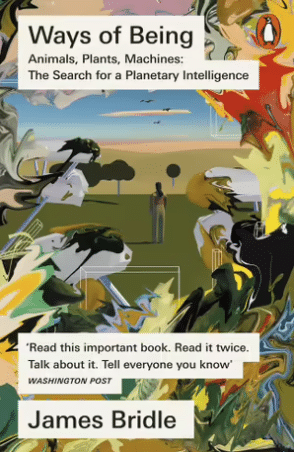Ways of Being – Animals, Plants, Machines: The Search for a Planetary Intelligence – James Bridle, Penguin July 2022

At the heart of Ways of Being is the idea that intelligence is not a property of brains, central nervous systems or even individual organisms but a collective phenomenon that arises between things. Author James Bridle, computer scientist, artist and artificial intelligence expert, suggests it is hubris that led us to define intelligence as ‘what humans do’ and sets out to democratise it, to show that intelligence is everywhere.
Bridle argues that biological phenomena such as horizontal gene transfer, fungal networks, plant chemical defences and endosymbiosis – the process by which free living single-celled organisms became the mitochondria, chloroplasts and other organelles in plant and animal cells – represent scientific evidence for panpsychism, one of the oldest philosophical ideas and a popular theory of mind in the nineteenth century. These phenomena are seen as evidence that there are no boundaries between species, that intelligence is a purely relational phenomenon and hence ‘everything is intelligent’.
Ways of Being ultimately sets out to break the nexus between nature and culture, to show that humans do not live as Aristotle suggested at the pyramid of creation but belong as Bruno Latour suggested in a ‘parliament of things’. This noble task of undoing four hundred years of Descartes’ influence on nature-culture dualism has preoccupied many over the last century, but you won’t find any reference to Alfred North Whitehead, Stephen Toulmin, Phillipe Descola, Clarence Glacken, Yrjö Haila, Daniel Dennett, Caroline Merchant, Peter Godfrey-Smith, Val Plumwood or any of the other philosophers who have made this their life’s work.
What Bridle does not acknowledge is the possibility of ‘design without a designer’, Daniel Dennett’s description of natural selection as a process that solves problems without forethought and is therefore capable of producing mind from matter without outside assistance.
While Darwin characterised the environment as the original natural selector, what Dennett and others have pointed out since is that evolution has not stopped evolving, that plants and animals are active participants. Plants change their environments to suit themselves and their symbionts while animals participate in natural selection by learning from each other, predicting the consequences of their actions and using tools.
Each of the nine chapters in Ways of Being ends with an imperative, a statement of what must be done to avoid ‘A new Copernican trauma… wherein we find ourselves standing upon a ruined planet, not smart enough to save ourselves’. Of these imperatives, three that are easy to accept are diversity, randomness, and monism (the inseparability of nature and culture), given that the first two are inherent features of natural selection and the third a consequence of it. The core proposition however, that intelligence is a purely relational phenomenon, remains an article of faith.
What Bridle ignores is the possibility that material explanations account for the remarkable biological phenomena he cites as evidence of ubiquitous intelligence. Explanations such as chemical and electrical gradients, the sensory abilities of plants and animals, and cooperative evolution which Darwin acknowledged was a challenge to his theory for which he had no answer. A hundred years after the publication of On the Origin of Species, biologist William Hamilton produced an explanation for inheritance of cooperative behaviour by natural selection which is now an accepted evolutionary process along with kin selection and reciprocal altruism.
Bridle also misrepresents ecology as aiming to ‘find connections between all things’. Ecology like all branches of science sets out to test assumptions and hypotheses, not support them. To approach ecology with the conviction the everything is connected in ways more meaningful than simply being on the same planet, sharing the same ocean or breathing the same air overlooks the fact that the consequential connections between species – cooperative, competitive, mutualistic and antagonistic – are temporary, opportunistic and constantly being broken and reformed as a result of speciation, extinction and adaptation.
Which begs the question, how does Bridle’s concept of intelligence evolve? And if it evolves through natural selection, what is the unit of selection, the equivalent of the genes, individuals or groups on which natural selection acts? Do the units of selection reside in things or in the space between them, or does relational intelligence evolve through means other than natural selection?
You won’t find answers to these questions because this book is ultimately not about science. Like anthropology’s New Animism, this is ‘outsider’ philosophy. Not based on thousands of years of lived experience or hundreds of years of debate but newly-minted, using biological phenomena to support a metaphysical concept which, as presented here, is beyond the reach of empirical evidence.
There is no doubt that the central idea in this book challenges conventional thinking about our place in the world and through that, provides a source of hope to anyone searching for a path out of humanity’s dilemmas. Brenna Maloney in The Washington Post said at the conclusion of her review:
“Bridle has created a new way of thinking about our world, about being. How would we live our lives and change our world if we embraced this thinking? If we did not place ourselves at the center of everything? Please read this important book. Read it twice. Talk about it. Tell everyone you know.”
Taking ourselves out of the centre of things remains humanity’s big challenge. However there’s a cost to Bridle’s way of doing this. Substituting yet another form of mysticism for uncertainty and the unknown has the potential to do the opposite of grounding ourselves in readiness for the challenges ahead. Read this book by all means, but also read Daniel Dennett and Terrence Deacon to get a glimpse of how others have proposed that mind could emerge from matter, and this amazing thing called life could – without magic or mystery – evolve the intelligence to contemplate itself and its place in the world.



